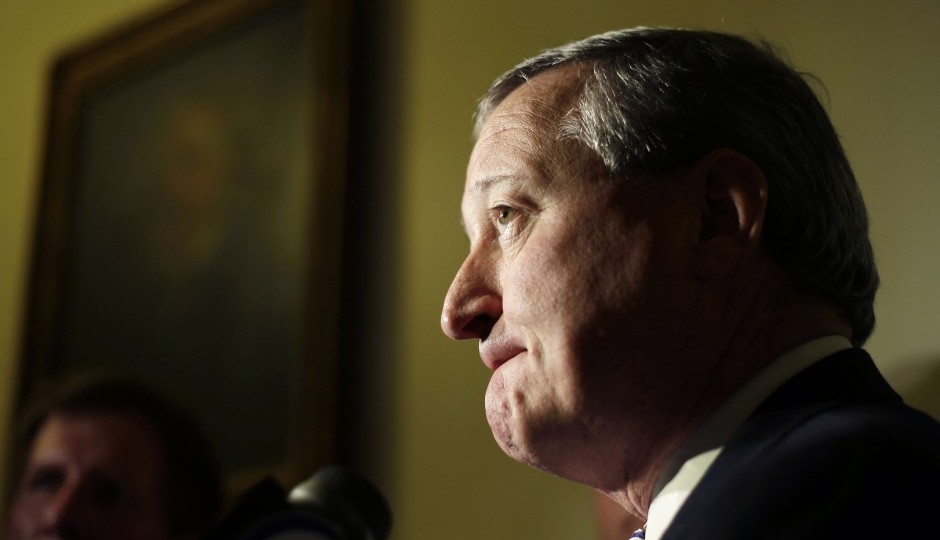5 Takeaways From Kenney’s Chamber of Commerce Speech

Photo by Matt Rourke/AP
In his first few weeks as mayor, Jim Kenney didn’t announce many new or surprising initiatives. On Inauguration Day, City Council Darrell Clarke unveiled more ambitious plans than Kenney did; just last week, it was Clarke — not Kenney — who rolled out a massive jobs plan in the mayor’s reception room.
During his speech at the Greater Philadelphia Chamber of Commerce’s annual mayoral luncheon on Wednesday, Kenney had an opportunity to change that. Past mayors have used the event to reveal some of the ideas up their sleeves. In fact, a spokeswoman for Kenney said last month that he didn’t provide more specifics on Inauguration Day because he planned to do so at two other events: the chamber talk and his budget address.
So did Kenney follow through? Here are five takeaways from his speech to the Chamber of Commerce:
- At last, he finally announced new proposals. Some were more ambitious than others. Kenney said the city will make a “significant” investment in the city’s rec centers, parks and libraries (something he’s been hinting at for a while). He said he will propose a five-year plan that continues to cut wage and business taxes (an announcement that inspired a hearty applause from the audience). He also said he’ll launch a campaign to recruit suburban businesses to open offices in the city, and hire a Director of International Investment to attract companies from around the world. There’s more where that came from. Read about Kenney’s other proposals announced Wednesday here.
- He made a case for universal pre-K. Kenney is hoping to partially fund the expansion of pre-K by soliciting businesses for money, so this part of the speech was particularly important. Kenney argued that inadequate educational opportunities for Philadelphia schoolchildren directly affect local businesses. “The city has to spend hundreds of millions of dollars not on lowering our taxes or on other incentives for business development, but on incarceration and social services because so many of our schools do not provide our children with the tools to lift themselves out of the circumstances into which they were born,” he said. “To meaningfully change the academic outcomes of our schools, the single most important investment we can make is in pre-K.”
- Interestingly, he did not directly ask the audience to chip in for pre-K. At one point, he really seemed like he was going to. It was when he said this: “I know for many in the business community, your concern is not whether or not we should expand access to pre-K, but how we are going to pay for expanding it.” Rather than ask to the city’s business leaders for help afterward, though, Kenney said he would explain how to fund universal pre-K in his March 3rd budget address. This was a purposeful move by Kenney. He said that “for too long, this address was essentially seen as the mayor’s to-do list for the business community.” He wanted his speech to be different. “If Philadelphia is to succeed,” he argued, “the relationship between government and business cannot be based on a list of demands; it has to be a true partnership.” Was this a smart strategy on Kenney’s part? Or a missed opportunity? Only time will tell.
- For an event that is typically all about big biz, he talked a lot about small businesses. Kenney spoke at length about his plan to improve the city’s commercial corridors, where many of the city’s small businesses have set up shop. He said he wants to increase funding to neighborhood organizations so they can hire “corridor managers,” who will “act as boots on the ground, creating a neighborhood economic environment that support existing businesses and attract new ones.” He also said the city will continue providing funding to community development corporations that manage sidewalk cleaning projects and install security cameras. Plus, he said Commerce Director Harold Epps has started a commercial corridor outreach tour. To be sure, Kenney announced plans that will impact big businesses, too — such as reforming the Licenses & Inspections department and luring suburban companies to the city — but he gave a noteworthy amount of love to small businesses.
- He made the strongest case of all for increased parks funding. The most memorable part of Kenney’s speech came not when he pushed for pre-K, but when he advocated for more funding for parks and rec centers. He said that the Parks & Recreation department “is the largest provider of after-school programming for Philadelphia’s children, which is a critical service given that some 57 percent of all violent crimes by juveniles occur on school days, and 19 percent are in the after-school programming hours.” He said that when private and public funders invested $5 million in Hunting Park, crime within a half-mile radius of the park dropped by 89 percent within three years. Likewise, he said that juvenile arrests fell by 28 percent in Fort Myers, Florida after that city implemented its “Success Through Academics and Recreational Support” program. Those are pretty remarkable statistics.